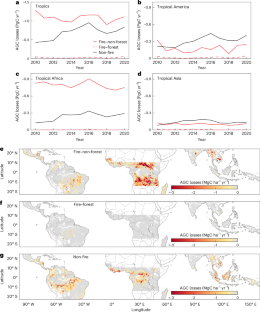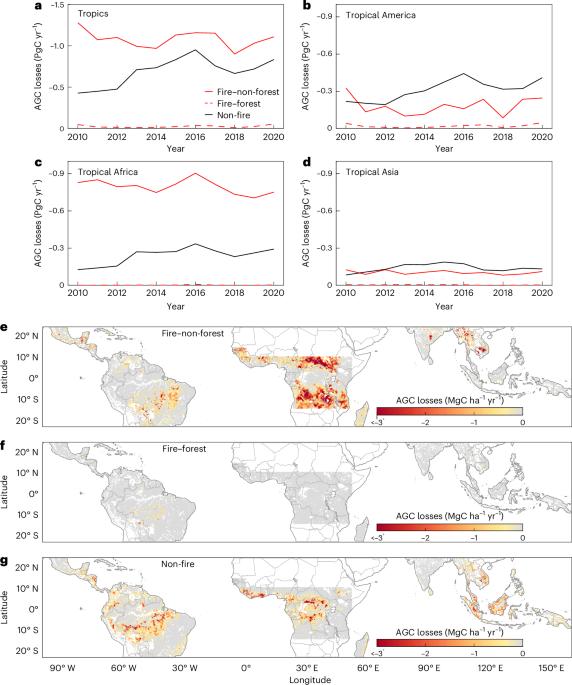Global patterns and drivers of tropical aboveground carbon changes
IF 29.6
1区 地球科学
Q1 ENVIRONMENTAL SCIENCES
引用次数: 0
Abstract
Tropical terrestrial ecosystems play an important role in modulating the global carbon balance. However, the complex dynamics and factors controlling tropical aboveground live biomass carbon (AGC) are not fully understood. Here, using remotely sensed observations, we find a moderate net AGC sink of 0.21 ± 0.06 PgC yr−1 throughout the global tropics from 2010 to 2020. This arises from a gross loss of −1.79 PgC yr−1 offset by a marked gain of 2.01 ± 0.06 PgC yr−1. Fire emissions in non-forested African shrubland/savanna biomes, coupled with post-fire carbon recovery, substantially dominated the interannual variability of tropical AGC. Fire radiative power was identified as the primary determinant of the spatial variability in AGC gains, with soil moisture also playing a crucial role in shaping trends. We highlight the dominant roles of anthropogenic and hydroclimatic determinants in orchestrating tropical land carbon dynamics and advocate for land management to conserve indispensable ecosystem services worldwide. Tropical aboveground biomass carbon is a crucial, yet complex, component of the terrestrial C budget. Here remote observations demonstrate that fire emissions and post-fire recovery in non-forested African biomes dominate the interannual variability of aboveground biomass carbon, which acts as a moderate net C sink.


热带地上碳变化的全球模式和驱动因素
热带陆地生态系统在调节全球碳平衡方面发挥着重要作用。然而,人们对控制热带地上活生物质碳(AGC)的复杂动态和因素并不完全了解。在此,我们利用遥感观测数据发现,从 2010 年到 2020 年,全球热带地区的 AGC 年均净吸收量为 0.21 ± 0.06 PgC。这源于-1.79 PgC yr-1的总损失被2.01 ± 0.06 PgC yr-1的显著增加所抵消。非洲非森林灌木林/热带草原生物群落的火灾排放,加上火灾后的碳恢复,在很大程度上主导了热带 AGC 的年际变化。火灾辐射力被认为是 AGC 增益空间变化的主要决定因素,土壤湿度也在形成趋势方面发挥了关键作用。我们强调了人为因素和水文气候决定因素在协调热带陆地碳动态中的主导作用,并倡导通过土地管理来保护全球不可或缺的生态系统服务。
本文章由计算机程序翻译,如有差异,请以英文原文为准。
求助全文
约1分钟内获得全文
求助全文
来源期刊

Nature Climate Change
ENVIRONMENTAL SCIENCES-METEOROLOGY & ATMOSPHERIC SCIENCES
CiteScore
40.30
自引率
1.60%
发文量
267
审稿时长
4-8 weeks
期刊介绍:
Nature Climate Change is dedicated to addressing the scientific challenge of understanding Earth's changing climate and its societal implications. As a monthly journal, it publishes significant and cutting-edge research on the nature, causes, and impacts of global climate change, as well as its implications for the economy, policy, and the world at large.
The journal publishes original research spanning the natural and social sciences, synthesizing interdisciplinary research to provide a comprehensive understanding of climate change. It upholds the high standards set by all Nature-branded journals, ensuring top-tier original research through a fair and rigorous review process, broad readership access, high standards of copy editing and production, rapid publication, and independence from academic societies and other vested interests.
Nature Climate Change serves as a platform for discussion among experts, publishing opinion, analysis, and review articles. It also features Research Highlights to highlight important developments in the field and original reporting from renowned science journalists in the form of feature articles.
Topics covered in the journal include adaptation, atmospheric science, ecology, economics, energy, impacts and vulnerability, mitigation, oceanography, policy, sociology, and sustainability, among others.
 求助内容:
求助内容: 应助结果提醒方式:
应助结果提醒方式:


